President Tsai Ing-wen’s (蔡英文) low polling figures yesterday drew fire from within the pan-green camp, as presidential adviser and independence advocate Koo Kwang-ming (辜寬敏) called for Tainan Mayor William Lai (賴清德) to run for president in 2020.
“Tsai should be satisfied with just four years, because then she can push through reforms full throttle without having to care about the opposition,” Koo said, calling Lai the nation’s “future leader.”
“Lai is the star of tomorrow, and if Tsai steps aside, Lai should be the candidate of choice,” said Koo, who was Tsai’s rival in her first successful bid for Democratic Progressive Party (DPP) chairperson in 2008.
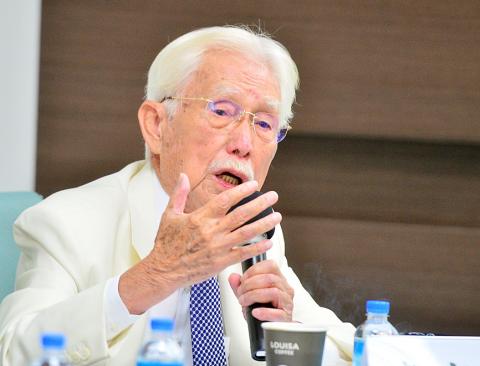
Photo: Wang Yi-sung, Taipei Times
He had also called for Lai’s nomination instead of Tsai in last year’s presidential race.
The Taiwan Brain Trust Foundation, which Koo founded and funds, yesterday published a series of comparison polls between the two that showed that Lai would garner higher support in most contests.
“Internally, DPP supporters’ preferences are split, but Lai has an obvious advantage in taking in supporters from other parties,” said Wu Shih-chang (吳世昌), general manager of Trend Survey and Research Co, which conducted the polls.
He cited figures showing that 20.8 percent of respondents would support Tsai, while 38.2 percent would support Lai.
The two politicians were statistically tied among DPP supporters, with Tsai registering a 39.2 percent level of support versus Lai’s 40 percent.
However, Lai was preferred by more than twice as many of all other political parties’ supporters.
The poll also examined a series of lineups against other potential candidates, finding continued higher favorability levels for Lai.
When pitted against Chinese Nationalist Party (KMT) chairman-elect Wu Den-yih (吳敦義), Tsai polled 45.9 percent support to Wu’s 25.9 percent, while Lai polled 59.3 percent to Wu’s 20.8 percent.
In comparison with New Taipei City Mayor and former presidential candidate Eric Chu (朱立倫), 42.2 percent of respondents supported Tsai to Chu’s 37 percent, while Lai received 53.9 percent compared with 31 percent for Chu.
Tsai enjoyed only a 38.1 percent level of support when paired with Hon Hai Precision Industry Co (鴻海精密) chairman Terry Gou (郭台銘), who has been named as a potential KMT candidate.
Gou polled at 44.4 percent when paired with Tsai, a figure that dropped to 37.5 percent when paired with Lai, who drew 48.4 percent.
“There is no single lineup in which Tsai would win an outright majority,” Ketagalan Institute president Chin Heng-wei (金恆煒) said, adding the results also demonstrated the potential wild-card influence of a presidential run by Taipei Mayor Ko Wen-je (柯文哲).
Any race involving Ko and Tsai would be tight, according to the poll, which found only 31.7 support for Tsai when paired against Wu (19 percent) and Ko (32.04 percent).
She garnered 30.2 percent support when paired against Chu (27.9 percent) and Ko (27.6 percent).
On the other hand, Lai’s support levels were comfortably ahead of both Ko and the two KMT candidates for both three-way races, receiving 43.5 percent support when paired with Wu (16.7 percent) and Ko (25.5 percent), and receiving 39.8 percent support when paired with Chu (24.6 percent) and Ko (22.9 percent).
Koo also backed down from previous calls for Premier Lin Chuan (林全) to be replaced, attributing low poll ratings to the Cabinet’s success in pushing through difficult reforms
“If Lai were governing today, his poll ratings would be similar to Tsai’s,” he said.
The random telephone survey was conducted on Tuesday and Wednesday last week. It collected 1,071 valid responses with a margin of error of 3 percentage points and a confidence level of 95 percent.
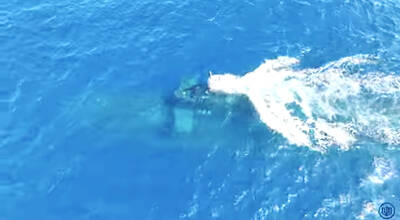
CSBC Corp, Taiwan (台灣國際造船) yesterday released the first video documenting the submerged sea trials of Taiwan’s indigenous defense submarine prototype, the Hai Kun (海鯤), or Narwhal, showing underwater navigation and the launch of countermeasures. The footage shows the vessel’s first dive, steering and control system tests, and the raising and lowering of the periscope and antenna masts. It offered a rare look at the progress in the submarine’s sea acceptance tests. The Hai Kun carried out its first shallow-water diving trial late last month and has since completed four submerged tests, CSBC said. The newly released video compiles images recorded from Jan. 29 to
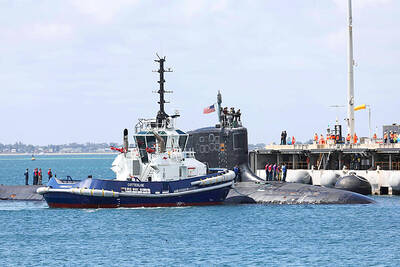
DETERRENCE EFFORTS: Washington and partners hope demonstrations of force would convince Beijing that military action against Taiwan would carry high costs The US is considering using HMAS Stirling in Western Australia as a forward base to strengthen its naval posture in a potential conflict with China, particularly over Taiwan, the Wall Street Journal reported on Saturday. As part of its Indo-Pacific strategy, Washington plans to deploy up to four nuclear-powered submarines at Stirling starting in 2027, providing a base near potential hot spots such as Taiwan and the South China Sea. The move also aims to enhance military integration with Pacific allies under the Australia-UK-US trilateral security partnership, the report said. Currently, US submarines operate from Guam, but the island could
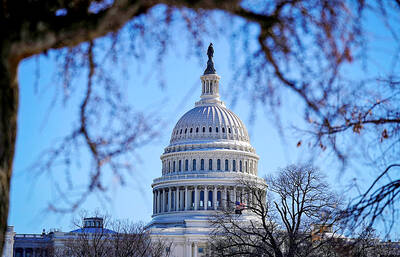
RESTRAINTS: Should China’s actions pose any threat to Taiwan’s security, economic or social systems, China would be excluded from major financial institutions, the bill says The US House of Representatives on Monday passed the PROTECT Taiwan Act, which states that Washington would exclude China from participating in major global financial organizations if its actions directly threaten Taiwan’s security. The bill, proposed by Republican Representative Frank Lucas, passed with 395 votes in favor and two against. It stipulates that if China’s actions pose any threat to Taiwan’s security, economic or social systems, the US would, “to the maximum extent practicable,” exclude Beijing from international financial institutions, including the G20, the Bank for International Settlements and the Financial Stability Board. The bill makes it clear that China must be prepared
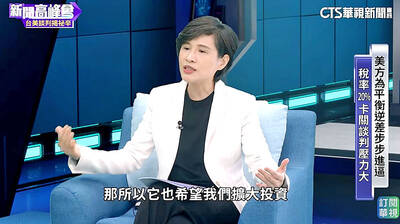
Taiwanese trade negotiators told Washington that Taipei would not relocate 40 percent of its semiconductor production to the US, and that its most advanced technologies would remain in the nation, Vice Premier Cheng Li-chiun (鄭麗君) said on Sunday. “I told the US side very clearly — that’s impossible,” Cheng, who led the negotiation team, said in an interview that aired on Sunday night on Chinese Television System. Cheng was referring to remarks last month by US Secretary of Commerce Howard Lutnick, in which he said his goal was to bring 40 percent of Taiwan’s chip supply chain to the US Taiwan’s almost